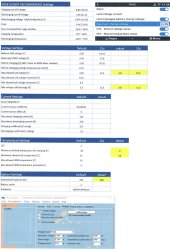Jokani
New Member
- Joined
- Apr 2, 2021
- Messages
- 18
New install of a Victron Multiplus and REC BMS with 16 x CALB SE200FI.
The max charging current I have seen is 13.5v, so the cells are never reaching a voltage high enough to balance.
Please could someone take a look at my settings and see if they can spot the problem, or maybe something else could be the cause?
Any suggestions to improve the settings, also appreciated.
I am pretty sure that the Multi and REC are communicating correctly over Can.
TIA
The max charging current I have seen is 13.5v, so the cells are never reaching a voltage high enough to balance.
Please could someone take a look at my settings and see if they can spot the problem, or maybe something else could be the cause?
Any suggestions to improve the settings, also appreciated.
I am pretty sure that the Multi and REC are communicating correctly over Can.
TIA




